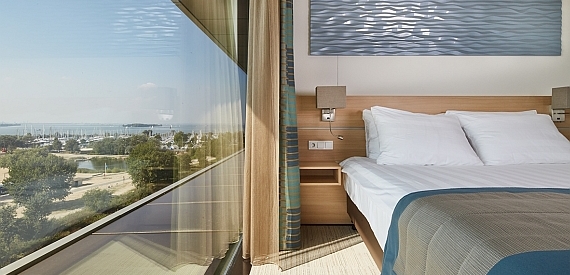
News & Stories
Alexandria, VA. In the battle to get their customers back, hoteliers should simply offer free, fast and wireless Internet access to all. A survey reveals a high potential for direct bookings just by making the stay of travelers simple and efficient.
Amsterdam. On July 14, 2016, giant cruise company Carnival Corporation, inaugurated "CSMART", the most advanced maritime simulation and training center in the world. Located in Almere, east of Amsterdam City, the facility has the particularity to also feature a hotel, the first one attached to a training academy and owned by a cruise company. Sarah Douag, our correspondent in Amsterdam visited the campus and met with Jan Roersma, Managing Director of Dutch company Hospitality Support Group, which manages the property.
Munich. Geo-political turbulences and developments in individual countries or regions are severely affecting the hotel industry these days. Investors as well as hotel operators, the "key players" of the industry, are facing unpredictable changes in the long term. The "Hospitality Industry Dialogue" at Expo Real 2016 mirrors these trends.
Paris. Confirming a disappointing summer season, the GNI, a group representing independent hotels in France, is sharing its deep worries with the government. A report reveals precise and depressing numbers. GNI provided a list of demands to the tourism minister.
Neuchâtel. The Swiss hotel industry recorded a total of 16.8 million overnight stays in the first half-year of 2016. This translates to a fall of 1.2% compared to the equivalent year-ago period. These are the preliminary findings by the Swiss Federal Office of Statistics.
Vienna. In the first three months of the summer season 2016, around 3.7% more guest overnight stays were recorded in Austria. The Germans remained faithful and took advantage of many attractive offers, but: Holiday apartments saw better booking figures than hotels.
Eschborn. The figures disprove the impression: The amount of bleisure has remained the same for the past five years. But more women than men and younger travelers are looking for the opportunity to combine business as leisure trips.
Paris. France is suffering. Recent reports confirm a significant drop in foreign visitors. Paris and the surrounding region are suffering most. They face a 750-million-euro loss in revenue for the first trimester only. Challenging is also the fact that important source markets like Japan and Russia are clearly avoiding France.
Milan. The first estimates of Italy's tourist high season draw a brilliant picture of the country’s travel market. More Italians travelled again, more stayed in their home country meeting more tourists that are international. And all of them spent more money.
London. Tour Operator Thomas signed a strategic hotel sourcing partnership with Webjet Limited, an Australia based leading online digital travel services provider.

